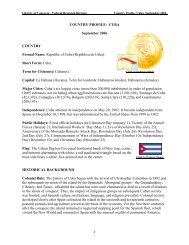1 - American Memory
1 - American Memory
1 - American Memory
You also want an ePaper? Increase the reach of your titles
YUMPU automatically turns print PDFs into web optimized ePapers that Google loves.
242<br />
nfTBODTTCnON<br />
In the early spring of 1962, a survey completed at tbe reqnest of former GkiTer-<br />
nor Quinn indicated that the people of Hawaii might face severe food shortages<br />
because of the maritime strike in progress. Survey results indicated that a two<br />
days' supply of rice and a seven days' supply of evaporated milk were in stock<br />
in retailers' and wholesalers' facilities and on strike-bound ships in Honolulu<br />
Harbor. Other food items were in somewhat better supply but nevertheless the<br />
situation appeared grave. (See Appendix III for a complete list of the items<br />
inventoried and their status.) The Governor was considering chartering shiiM<br />
to carry critical supplies (in fact the above-mentioned survey included questions<br />
which would enable the Governor's office to allocate the available space to normal<br />
shippers).<br />
It was in this environment that the Budget Session of the First Legislatnre of<br />
the State of Hawaii passed House Resolution No. 100, which requested an investi-<br />
gation into the cost and feasibility of either a state or privately-operated ware-<br />
housing system on state lands on Sand Island. (See Appendix I for H.R. No.<br />
100.)<br />
A basic assumption underlies this resolution: That Hawaii is continually and<br />
almost completely dependent upon a so-called "floating warehouse" system (and<br />
therefore any interruption of shipping or unloading results in a disruption of<br />
trade and commerce within the state and a resultant shortage of critical sup-<br />
plies). The "floating warehouse" concept is taken to mean that Hawaiian bu^-<br />
nessmen maintain little or no extra inventories—relying instead on a continual<br />
replenishment of supplies from the mainland.<br />
This study will consider this basic assumption, as its validity has obvioua<br />
implications. If, in fact, local wholesalers and retailers are using Matson ships<br />
as a floating warehouse, then some way may have to be found for increasing<br />
stocks or assuring more dependable deliveries.<br />
The major thrust of this study will be concerned with the possibility of a stock-<br />
piling solution, if such Is necessary. In other words, extensive discussion of other<br />
possible solutions, e.g. labor legislation or government intervention, will not be<br />
undertaken.<br />
Even before evaluating the "floating warehouse" assumption, we will Investi-<br />
gate the impact of maritime strikes on the State of Hawaii. Superficial question-<br />
ing by the author indicated that no one was really hungry during the 1962 strike.<br />
Thus it seems important to determine if there really Is a problem or whether<br />
public sentiment was unduly ak-oused about the graveness of the situation.<br />
FINAL EVALUATION OP THE FB^ASrBILITT OF A STOCKPILING FBOORAM<br />
(AN INTEGRATING SDMMABY AND CONCLUSION)<br />
The basic thrust of this study has been to investigate the feasibility of the<br />
State of Hawaii encouraging or subsidizing tbe building of stockpiles as a<br />
hedge against the impact of maritime strikes.<br />
Consumers Interested in Stockpiling<br />
The supporters of Rouse Resolution No. 100 correctly read the "pulse" of<br />
voters with respect to their interest in assuring adequate food supplies during<br />
strikes. Seventy-two per cent of those interviewed in the consumer survey con-<br />
ducted as part of this study thought that it was a good idea for the state to<br />
stockpile foods to make sure there would be adequate food supply during any<br />
strike.<br />
Consumers Not Interested If Stockpiling Too Costly<br />
When the Impact of higher inventory costs on prices was mentioned, however,<br />
interest dropped noticeably. In response to the question—"Would you still be<br />
interested If it caused a regular .5 per cent increase in your prices?"—only 40<br />
per cent were still interested and only 14 per cent were still interested If It<br />
caused a regular 10 per cent increase In their prices. In other words, Hawaiian<br />
housewives have a tolerance level—they feel prevention of shortages due to<br />
strikes can become too expensive. It seems probable that consumer support for<br />
a stockpiling program would dissipate if they knew the present and potential<br />
costs of carrying extra Inventories and their impact on consumer prices.<br />
Inventories Already Large Where Feasible<br />
House Resolution No. 100 contemplated building stockpiles on the assumption<br />
that Hawaiian businesses were using Matson ships as "floating warehouses" and<br />
therefore not carrying their own stocks. But as we have seen, a "floating ware-



![Albert Einstein Papers [finding aid]. Library of Congress. [PDF ...](https://img.yumpu.com/21604228/1/190x245/albert-einstein-papers-finding-aid-library-of-congress-pdf-.jpg?quality=85)





![American Colony in Jerusalem Collection [finding aid]. Library of ...](https://img.yumpu.com/17941275/1/190x245/american-colony-in-jerusalem-collection-finding-aid-library-of-.jpg?quality=85)



![Piccard Family Papers [finding aid]. - American Memory - Library of ...](https://img.yumpu.com/17941234/1/190x245/piccard-family-papers-finding-aid-american-memory-library-of-.jpg?quality=85)


